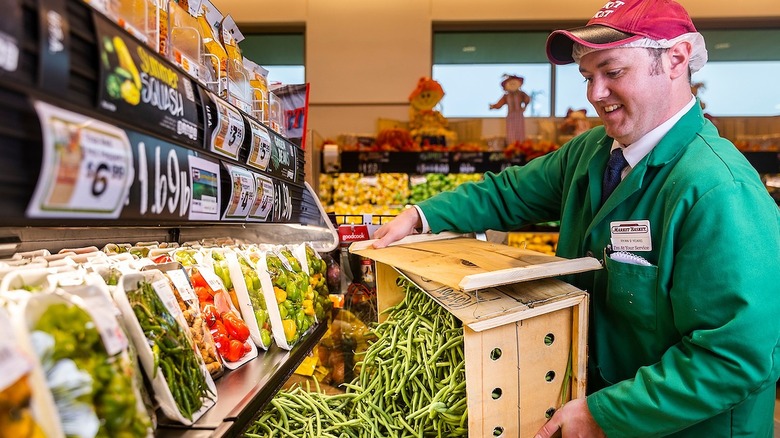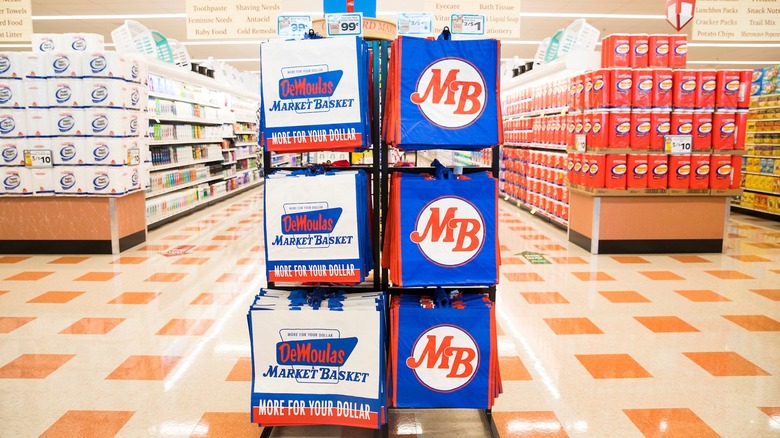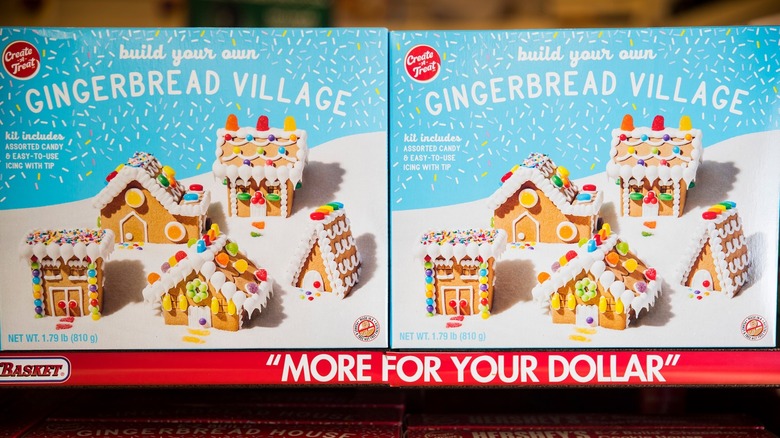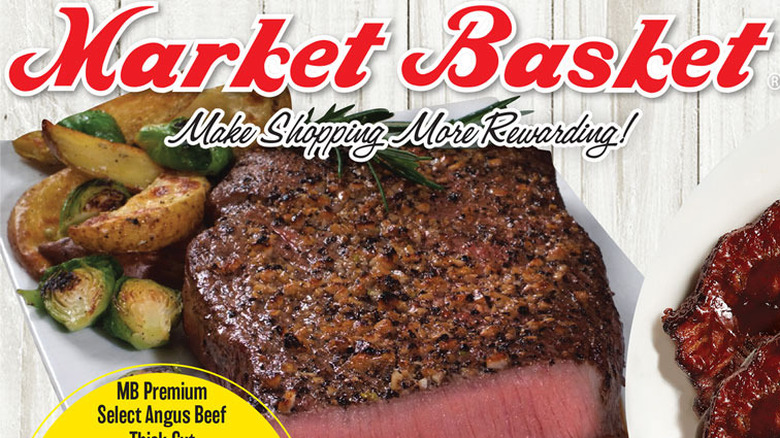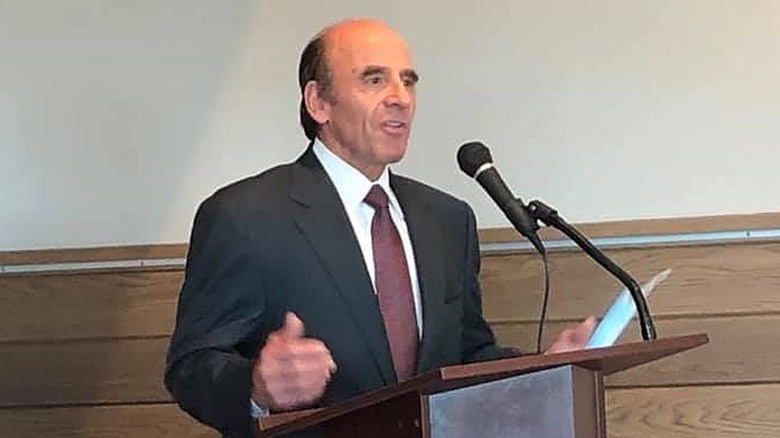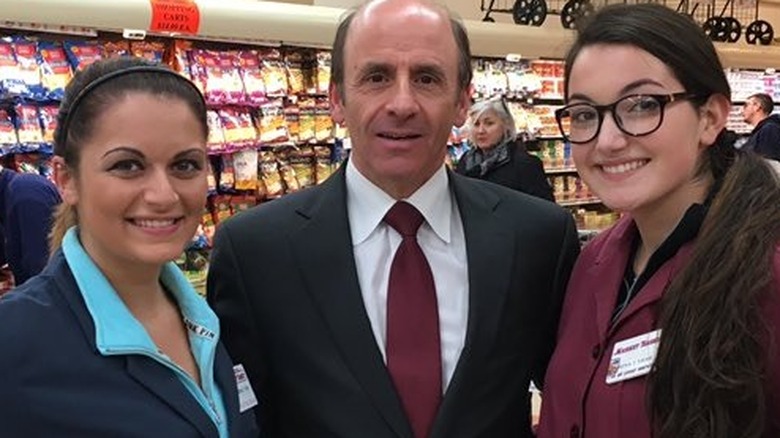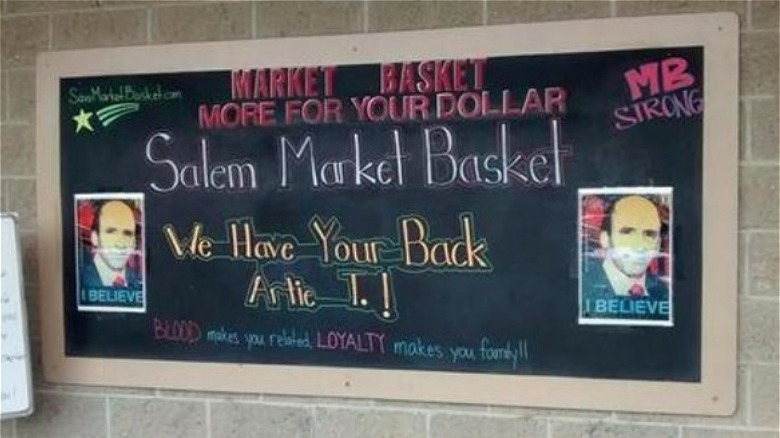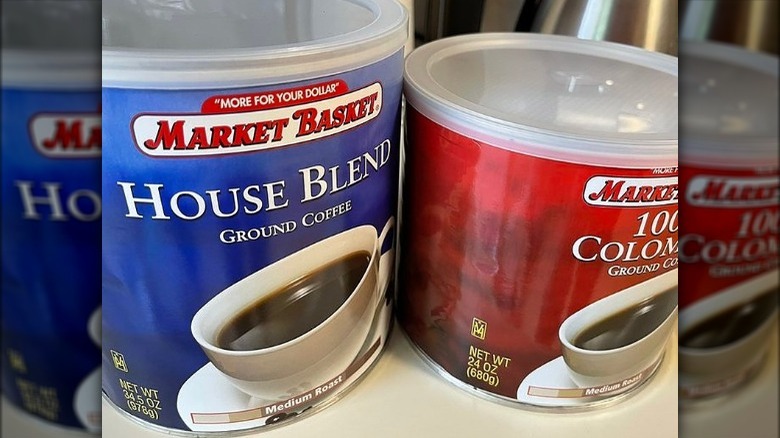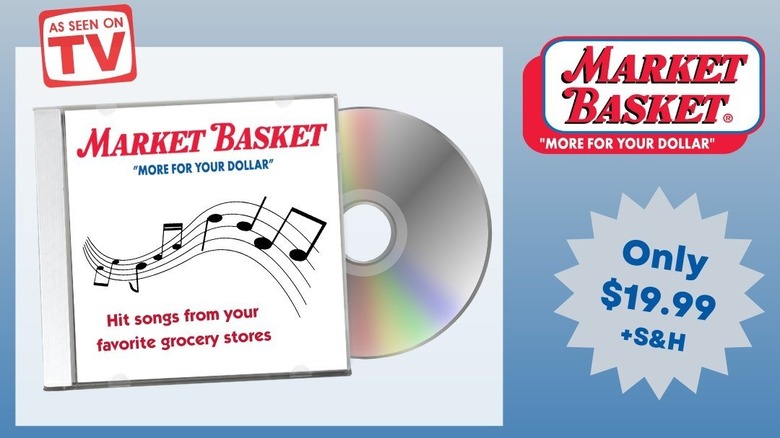Market Basket: The Story Behind The Beloved New England Supermarket
Nothing is more crucial to a business's long-term success than customer loyalty. Of course, the process of earning that allegiance is no easy feat, since humans tend to be fairly fickle folks. But it doesn't take an MBA to recognize the best path toward that ideal end game (where customers willingly and repeatedly patronize an establishment) is to provide superior products, top-notch customer service, and unbeatable prices.
Sounds easy, right? In theory, it is — but tell that to the 70% of small businesses that fail to make it past 10 years before permanently closing (via Fundera). Still, while finding success as a new business is a tall order, it can be done. Just look at the Demoulas family and its immensely popular supermarket chain Market Basket.
Some Americans may have raised an eyebrow when Market Basket ranked as the third-best U.S. grocery store chain in a 2022 Retail Preference Index survey by Dunhumby. But any New England resident (outside of Connecticut and Vermont) who lives near one of its many locations probably wondered why it wasn't number one.
For long-time patrons of the Massachusetts-born supermarket, the beloved chain's appeal is crystal clear. But if you've never had the unmatched pleasure of getting "More for Your Dollar" (and, well, even if you have), allow us to shine a spotlight on Market Basket's one-of-a-kind regional success story.
Its first store opened in 1917 under the name DeMoulas Market
As countless people who have immigrated to this great nation can attest, the American Dream isn't exclusive to U.S.-born citizens. No matter their birth country, anyone willing to put in the genuine effort required for success can achieve their goals here. Athanasios and Efrosini Demoulas undoubtedly understood this when they first moved to the U.S. from Greece (via Market Basket). And in 1917, nine years after their arrival, the pair's hard work paid off when they opened the first DeMoulas Market in Lowell, Massachusetts.
Lowell was the perfect spot for an immigrant to open a small business in the early 20th century. After all, according to the Lowell Historical Society, more than one-third of the city's 112,759 residents were foreign-born in 1920. Consequently, the fact that the original DeMoulas Market store's customer base was largely comprised of the city's Greek, Irish, and French community members is easily comprehensible.
Though the once-bustling mill town was in an unstoppable industrial decline by the 1910s (via National Park Service), that didn't change the fact that people still needed to eat to survive. DeMoulas Market wasn't immune to the city's financial woes, but by building a strong and resilient product, it weathered the Great Depression, eventually expanding into a new superette location in 1950.
It allowed customers to purchase items on credit years before the concept was popularized
The idea of using credit to obtain goods is second nature to modern-day consumers. But like any other commonplace aspect of 21st-century life, it had to start at some point in the past. In fact, credit cards didn't really exist before the introduction of the Diner's Club card in 1950 (via U.S. News and World Report). The lack of a nationwide network didn't stop certain businesses from instituting credit-type systems to assist struggling customers before then — including DeMoulas Market, which offered groceries on credit in the 1940s (via Market Basket).
Given the supermarket's deployment of consumer credit before it was widely used, it's not unreasonable to say the precursor to today's Market Basket was one of the first companies to offer this purchasing option. This clearly endeared the store to its customers and fostered a mutual devotion that continues to blossom, as evidenced by its high ranking among U.S. grocery chains.
Now, when you consider U.S. consumers had nearly one trillion dollars in total combined credit card debt as of November 2022 (via Forbes), the pitfalls of credit usage are clear. Still, after a lifetime of Market Basket shopping trips, we can't help but believe the Demoulas family's early credit offer was driven by compassion rather than profit.
The first officially-named Market Basket location opened in 1975
Most people raised in and around Massachusetts are likely aware that Market Basket stores used to be known as DeMoulas. After all, while the grocery chain has used the Market Basket title since 1975, a number of people who grew up with the original DeMoulas Market name continued using that moniker — even decades after the change.
It's hard to fault anybody who clung to Market Basket's original name, considering the very slow removal of all-things-DeMoulas from its stores. After all, even though the Market Basket name was first utilized in the mid-1970s, DeMoulas signs remained on display at numerous stores for decades after. In fact, the final DeMoulas-named company location (with the subsequent front sign) didn't close until 2010, when the so-named store in Salem, New Hampshire, shut down (via The Eagle-Tribune).
By now, the Market Basket name is fully ingrained in the company's DNA. And it's not like the Demoulas name will be forgotten any time soon. After all, Arthur T. Demoulas (the founders' grandson) remains the Market Basket CEO and President as of 2022 (via Lowell Sun).
Its More for Your Dollar slogan is more than a simple motto
Market Basket didn't introduce its "More for Your Dollar" slogan until 1954, but it's clearly been the supermarket chain's ethos since the beginning. More than 100 years after Athanasios and Efrosini Demoulas opened their first store, that legacy remains intact. The chain consistently practices what it preaches, providing an unmatched value that keeps customers coming back. After all, as Kevin Brasler, editor of Boston Consumers' Checkbook, told WCVB5 in 2019, "Its prices are astonishingly low compared to a lot of other chains in the area."
Actually, Market Basket's approach toward the supermarket business isn't just unmatched by northeast grocery chains, something 2022's historically-high inflation has demonstrated. In fact, in September 2022, Market Basket was named the lowest-priced chain in the entire U.S. during inflationary times by Dunhumby's Retailer Preference Index. As of November 2022, the store's prices were 18% lower than the all-store average for Boston area grocery chains (via Consumers' Checkbook).
Of course, if you ask any regular Market Basket shopper — or consider its history of assisting customers during hard times when it first offered credit for groceries in the 1940s — this outcome was hardly unexpected. Still, it's always nice to have your beliefs reaffirmed by cold hard facts.
No Market Basket stores are located in Boston despite its Massachusetts roots
Market Basket has a deep and diverse history in the Commonwealth of Massachusetts. Not only was it first founded in the historic mill town of Lowell, Massachusetts, in 1917, but it remains headquartered in the nearby town of Tewksbury more than 100 years later. Of course, if you aren't familiar with the area or have never been to Boston, you'd likely presume the Massachusetts state capital contains a bevy of Market Basket supermarkets. Alas, as of 2022, not a single Market Basket is located within the city.
Now, we'd love to shine a light on this fairly bizarre reality. But the bottom line is it's somewhat unclear why Boston is devoid of Market Basket locations. Sure, several possible explanations exist, a number of which were shared on a Reddit thread in 2018. One likely reason is that general costs associated with operating in the city itself are prohibitive.
Still, the supermarket chain's identity seems so ingrained in Massachusetts that it's inherently odd it's avoided opening in the capital city. We're not questioning the logic or the company's brain trust behind such decisions — we're just pointing out the peculiarity.
It's not the only US grocery chain called Market Basket
While we're intimately familiar with the beloved New England supermarket chain, we had no idea Market Basket also exists in Texas — only it's an entirely different, unrelated chain called Market Basket, as well. The other Market Basket first began its operation in 1961, though we weren't able to confirm whether it has used that title from the very beginning.
Either way, with a total of 31 supermarkets located in southeast Texas and Louisiana as of 2022, it's clearly carved out its own niche under the brand — one wholly unrelated or connected to the Market Basket headquartered in Tewksbury, Massachusetts. Having never visited the non-Demoulas-owned Market Basket, we can't really compare the two. So we'll just say this: If the Market Basket brand from outside New England can match even half the quality of its counterpart, then Louisiana and Texas residents are a lucky bunch.
The Demoulas family spent decades battling over the company's ownership
The history of Market Basket's ownership isn't challenging to track. After all, the company has always been owned and operated by members of the Demoulas family — a tradition started when brothers Telemachus and George purchased the original store from their parents for $15,000 in 1954. But the family side of the business hasn't always gone smoothly, with a long-running feud between Demoulas family members playing out both in and out of the public eye, starting in the 1990s (via Boston Herald).
Frankly, from the outside looking in, it's hard not to judge certain members of the Demoulas family for their choices. We'll spare most of the details surrounding the fairly ludicrous legal drama (including an instance where one cousin punched another in court), which sounds more like a TV script than a real-life series of events.
Of course, as anyone who remembers the Market Basket strike and boycotts from 2014 knows (via Lowell Sun), the simple version revolves around two cousins, both named Arthur. The efforts spearheaded by Arthur S. to fire his cousin (and CEO) Arthur T. from the company in July 2014 led to a final resolution of the messy family situation (though not the one Arthur S. had wanted). In August 2014 after decades of battling, an agreement was reached and Arthur T. took complete ownership of Market Basket.
The firing of its CEO in 2014 caused a massive employee strike
The notion that a company's employees truly love their boss has been thoroughly deconstructed through the years (perhaps most memorably with Michael Scott on "The Office"). But while it may not be a universal sentiment, there are employers who treat their employees in such a way that nurtures genuine loyalty amongst the workforce. Market Basket is a shining example of what's possible when a company truly appreciates its workers — something perfectly illustrated by the 2014 employee strike in response to the firing of its CEO (via WBUR).
Now, we've never worked at Market Basket nor have we met the CEO in question, Arthur T. Demoulas. But the swift steps taken by employees in reaction to his unjust ousting in July 2014 — striking for six weeks until Arthur T. was reinstated and had purchased the entirety of the company from his cousin Arthur S. (via Lowell Sun) — tell us everything we need to know.
The fact that an entire company would strike in support of their boss's firing (rather than something usual, like better pay or working conditions) is still sort of surreal nearly a decade later. Not that we're criticizing the decision or complaining about the outcome. After all, the grocery chain is still beating the competition in 2022.
The 2014 employee strike led to a widespread consumer boycott
One particular period in Market Basket's recent history undeniably confirms the company's customer loyalty. When the grocery chain's employees walked out en masse in July 2014 after the firing of popular CEO Arthur T. Demoulas, customers didn't keep shopping at the stores (via The Herald News). In fact, customers joined the striking employees, and a widespread consumer boycott simultaneously occurred.
Now, while boycott calls aren't always very impactful, the 2014 Market Basket boycott was a success story. Customers stopped going to the supermarket chain during that fateful six-week span, with sales dropping an eye-popping 90% as a result (via Lowell Sun).
Obviously, a company-wide employee strike would have been detrimental enough on its own. But the added customer solidarity with Market Basket employees ultimately proved too much. Finally, in August 2014, an agreement meeting the employees' demands for ending the strike — and consumer boycott — was reached.
A customer sued the chain in 2021 for allegedly misleading customers with its coffee labels
We like to assume companies and businesses are completely on the level with what they offer. But the nature of capitalism means it's fairly common for consumers to be cheated in pursuit of the almighty dollar. Now, Market Basket's sterling reputation with its customers is well-earned based on its across-the-board quality and consistently lower prices compared to other supermarkets (via WCVB). But that doesn't mean it's been immune to accusations of deceptive practices, including a February 2021 lawsuit alleging its store-brand coffee falsely advertised its size (via CBS News).
Perhaps we're a bit biased here (as most New England residents who've frequented Market Basket stores tend to be), but it's hard to take the lawsuit seriously. While it claims the label on both regular and decaf varieties of Market Basket's 11.5-ounce House Blend ground coffee cans was specifically intended to "deceive, mislead, and defraud" consumers (via Boston.com), we're not sure we buy that. After all, Market Basket has a superlative reputation among its customers and employees, and a long history to back up that belief.
We weren't able to find any information regarding a resolution to this lawsuit as of December 2022. But since Market Basket's official response to the suit indicated it no longer sells the product in question, we're taking the supermarket chain's side on the matter.
Market Basket jokingly announced a store-themed CD release for April Fools' in 2022
As evidenced by any number of corporate social media accounts, big companies understand a little humor goes a long way with consumers. No time of year presents a more perfect opportunity to pull a fast one on people than April Fools' Day — a day literally designated for practical jokes. With this in mind, we couldn't help but laugh when Market Basket announced the faux release of the store's hit songs CD on its Instagram account in April 2022.
Clearly, the idea of selling an antiquated piece of technology containing a collection of so-called grocery store songs is inherently amusing. But we have to applaud the clever twist of claiming it was "not available in stores," required a 6 to 8-week delivery window, and cost a relatively unreasonable $19.99 — plus shipping and handling, of course.
Interestingly enough, if you'd like to jam out to what you've heard in the store, several Market Basket-themed playlists can be found on Spotify as of 2022. They may not be officially linked to the chain — but we can confirm we've heard the vast majority of songs included on several playlists inside Market Basket.
The company was accused of age discrimination in a 2022 lawsuit
Unless you're a straight-up jerk, you're probably cautious about offending people based on their race, gender, age, or any other potential factor. This is true of many corporations, as well, though concerns are likely more rooted in avoiding legal repercussions for discriminatory practices. Of course, those legal safeguards exist because companies have been known to suppress employees' advancement for unsavory reasons — or at least, they have been accused of such actions. The latter was the case with Market Basket in November 2022, when an employee sued it for alleged ageism (via New Hampshire Union Leader).
We'd love to dismiss the lawsuit as sour grapes from an unsatisfied employee. But 62-year-old employee Rodney Martinez only filed the lawsuit after New Hampshire's Human Rights Commission found his complaints regarding age-related grievances held merit (via New Hampshire Business Review) — and frankly, we're not apt to reflexively dismiss the HRC. Among the accusations, Martinez claimed the store he worked at denied his requests for a promotion to full-time status, despite already working full-time hours while classified as a part-time employee.
Given its recent occurrence, we're not sure how this particular legal case will play out for Market Basket. But we have to hope some sort of resolution can be agreed upon sooner than later — one that brings satisfactory closure to all parties.
